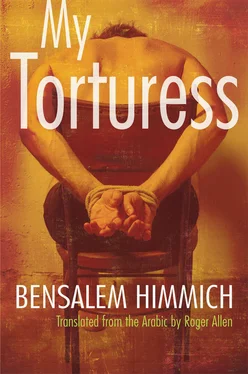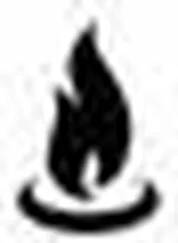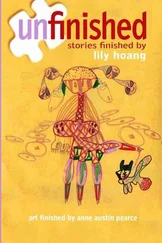There was a knock on the door indicating that I should take my lunch. I replied that I was not going to stand up or eat until they brought me two crutches and bandaged my feet. The guard came in, put down the plate by me, and then left, saying: “All the messenger can do is to convey the message.”
I covered the plate with a cloth so the insects, rats, and mice would not smell it. I stayed there, flat on my back, staring at a tiny aperture in the skylight and gauging the passage of time by the way the light changed. I kept wondering what would transpire as a result of my request and my refusal to eat.
From the other cells adjacent to my own there emerged a variety of sounds: one person was reciting verses from the Qur’an; another was inviting his neighbors to listen to his tales as a peerless dormitory storyteller, and still another was suggesting that we all listen to his sex jokes with a particularly Marrakeshian quality to them. As the din grew louder and louder, a powerful, gruff voice with a tone like a bugle yelled: “Quiet!! Quiet! No more noise for the rest of the day. Time will tell, as the old saying goes. Democracy demands that people take turns to talk. Anyone who causes trouble will be shown no mercy or sympathy.”
These words were the cue for a total silence to reign over the entire cellblock. I kept waiting for the storm to break, but nothing of the kind happened. As the atmosphere of silence spread, accompanied by a lacerating cold that promised a freezing, rainless winter, I huddled under my blanket and surrendered all my fears and concerns to a restless slumber prompted by Morpheus or some other sleep promoter. .
17.Appointment with the Disciplinary Committee
When I woke up, my memory was still recalling snippets from a dream in which my cousin, al-Husayn, appeared and asked me to forgive him for the things that had now happened to me because of him. He told me that he had not given me any information about his resistance activities so that I could avoid any suspicion or complication that might have dire consequences. However, the blind, raging fury of the despots had managed to ruin his sincere wishes and intentions toward me. After calling down all kinds of eloquent and pointed curses on such people, he advised me to remain steadfast in the face of their atrocities so that the word of God should eventually emerge triumphant. He then disappeared from view, accompanied by a group of armed men who made for the forests of some daunting lofty mountain peaks.
My response to his image was one that I framed once I had woken up. I proceeded to write it down immediately:
“You’re not at fault in what has happened to me, al-Husayn. You’ve done nothing wrong. You’re so right: endurance is now my richest resort and patience in adversity is a natural instinct. So rest assured about me and concentrate your attention on your own situation and that of your men — and may God grant you all such success as He desires.”
I wonder now whether it was just to pass the time or rather to suppress the rampant hunger I was feeling that I fainted or else fell asleep, but only after I had hidden away my notes.
The thing that woke me up again with a jolt was the noise of pounding feet in the cellblock as a whole squad of detectives arrived to search every cell, inside and out. The majority of them were foreigners. When a group of them entered my cell, the senior one told me to stand up and face the wall, with my hands up. I showed them my feet, and they understood that I was crippled. They lifted me off my bed and used an electrical device to check all over my body. My pockets were emptied, and the contents were carefully examined. The man gave me back my spray, but kept Na‘ima’s little containers. Now everything around me was searched both by hand and with the same electrical device. One of them showed me my containers, mirror, notes, and old magazines and asked me in awful Arabic what else I had. Was I concealing hashish, a knife, a razor, bribes? I shook my head. Once they had left, I waddled over to my now rumpled bed and collapsed on it, thinking all the while about the fact that my notes had been taken away and what evil consequences might ensue as a result.
The fact that I was staying away from the cafeteria, the courtyard, and the recreation area may well have convinced the authorities that I was in danger of becoming completely paralyzed and that my hunger strike was serious. Only a few hours after this group of detectives had left, two male nurses arrived and transported me to the hospital on a stretcher. Someone started tending and bandaging my feet while another person force-fed me using a plastic tube that he stuck up my nose and down into my stomach. I had no choice but to endure the variety of pain that these twin operations caused me. Even so, I managed to spend some of the time thinking about Na‘ima and her friend, the foreign doctor, about both of whom, as a precautionary matter, I had declined to ask for any information.
Once the two nurses had finished their task, they stood me up on two fresh crutches and handed me over to a portly guard with a shaved head. Looking at his watch, he took me to a lower level in the same hospital building and positioned me in front of a small table facing a huge dais. Two men and a woman now emerged from a door at the back and sat down on their chairs, whispering to each other. They were then joined by the female ghoul, who placed headphones over her ears, and Na‘ima herself — yes indeed, Na‘ima — who had a file under her arm. They sat at either end of the table. I assumed that the people whom I did not know had some particular function at the detention center. The guard whispered in my ear that I was in the presence of the Disciplinary Committee. After sitting me down, he stationed himself behind my back, holding on to my neck.
The woman was the first to speak, reading out a text that identified who I was. Once she had finished, she asked me to confirm the information that she had read out. I nodded my agreement, but the guard cuffed me on the neck and instructed me to stand up and respond “Yes, Madam President,” so I did so. She asked me to remain standing and to observe a minute of silence out of respect for a dead lady who had passed away. I did as she asked. Once the minute had passed, I asked her to tell me who had died.
“Your mother,” she replied gruffly. “We have the information from a reliable source.”
I collapsed on to the chair, thunderstruck and grief-stricken. But then I got a grip on myself, deciding that the resort to this grotesque method of talking about my mother was clearly a pack of lies; the only purpose had to be to make me crack.
“We are members of the august Disciplinary Committee,” the woman went on. “We’ve taken a look at the document about you and deduced from the investigative judge’s report that you’re a stubborn person, determined and resolute. You have displayed a remarkable ability to absorb blows and joined the hit parade in your willingness to tolerate pain; you deserve a gold medal for both. The judge actually characterizes you as a masochist, someone who relishes the thought of pain being inflicted on him. Such a group is as valuable as it’s rare. For that reason your own cooperation is of extreme interest to the directors of this center. They are prepared to accept — indeed, they actually desire — that you should join the service. Your health would be restored; your accusations would be dropped, including that of murdering your neighbor, the man with the bag, and that of fornicating with the woman who calls herself Fayruz. We’re willing to overlook all your crimes and faults, including your apparent craving for pornographic literature, your hunger strike, and so on and so on. All that would come in exchange for your signature on a document to join the service. What do you have to say?”
Читать дальше












